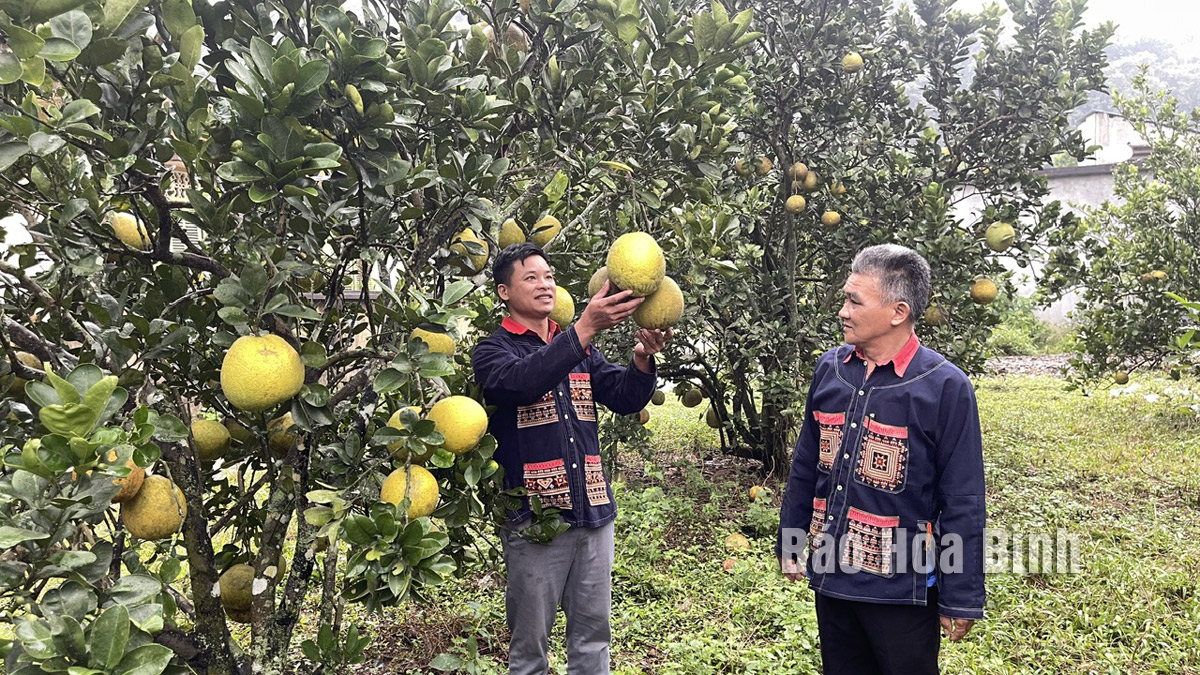
Dang Long village of the Dao ethnic people in Hung Son commune of Kim Boi district has seen remarkable changes. Solid concrete roads now connect the area, flanked by lush pomelo orchards. The lives of the Dao people have significantly improved.
Residents of Dang Long village, Hung Son commune, Kim Boi district shift to new crops, cultivating Dien pomelo with high economic returns.
According to head of Dang Long village Duong Van Minh, a 2.8km inter-communal road linking Dang Long to Vai Dao was constructed in late 2023 with state funding. To support the project, 11 households voluntarily donated over 900 sq.m of land, while villagers contributed labour and funds to upgrading branch roads.
In 2024, residents also raised over 100 million VND (over 3,900 USD) to expand a 1km road leading to Thung Chua, once a narrow trail accessible only on foot or by packhorse. The improved infrastructure has brought prosperity, with many households building new homes and acquiring modern amenities such as televisions, motorcycles, and even cars.
With better roads and electricity access, the life of local people has been improved. Residents have shifted to more profitable crops and livestock, cultivating economic staples while also experimenting with high-value fruits such as oranges and pomelos. Currently, the village comprises 63 households with over 930 residents, many of whom have embraced commercial forestry and livestock farming. Their efforts have paid off, with average annual incomes surpassing 30 million VND in 2024 and the poverty rate dropping to 20%. As economic conditions have improved, cultural traditions are being revived and preserved.
Secretary of the Dang Long Party Cell Ly Van Son highlighted the village's commitment to maintaining Dao heritage through festivals, traditional attire, language, and folk belief. In late 2024, the Party Cell admitted two new members, bringing its total membership to 14. All of its members have upheld their sense of responsibility, set good examples and led in all activities.
Despite lingering challenges, the Dao community remains committed to well observing the Party's policies and the State's laws, fostering a civilised lifestyle while eliminating outdated customs. During Tet, families gather to celebrate, reinforcing bonds within the village and preserving their rich cultural identity.
More than just an information technology teacher, Bui Van Nien is an inspiring figure who has nurtured the scientific curiosity and creative spirit of students in Vietnam’s ethnic minority communities.
Da Bac is the most disadvantaged mountainous district in Hoa Binh province, with ethnic minorities accounting for about 90% of its population. Over the past years, the district has mobilised resources to implement ethnic policies to improve the quality of life of local people.
In recent years, Hoa Binh province has consistently prioritised the protection, care, and education of children, particularly those from ethnic minorities and disadvantaged backgrounds, by creating a safe, healthy, and nurturing environment for their all-round development.
The Steering Committee for Tobacco Harm Prevention and Control of Hoa Binh province, in coordination with the Tobacco Harm Prevention and Control Fund, held a ceremony on May 28 in response to the World No Tobacco Day (May 31) and the National No Tobacco Week (from May 25 to 31). The event was chaired by Nguyen Van Toan, Standing Vice Chairman of the provincial People’s Committee and head of the Steering Committee.
Since 2021, the Center for Industrial Promotion and Industrial Development Consulting (CIIDC) under the Department of Industry and Trade has been implementing a school lighting model as part of the plan for using energy efficiently and economically in Hoa Binh Province in the pẻiod of 2021 - 2025. This model not only aims to improve the learning conditions and enhance the education quality, but it also promotes the message of energy saving, energy security, environmental protection and contributes to the goals of socio-economic development.
In the 2024 - 2025 school year, the entire Hoa Binh provincial education sector includes 520 educational institutions and schools. Among them are 13 ethnic boarding schools with 153 classes and 4,487 students. Four of these schools have met national standards, reaching 30.7 percent.



